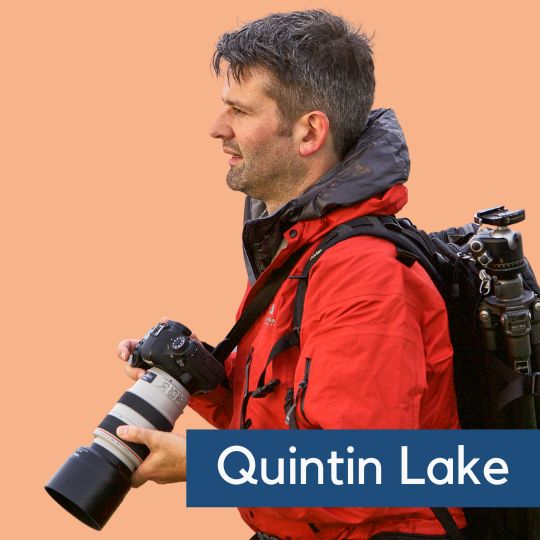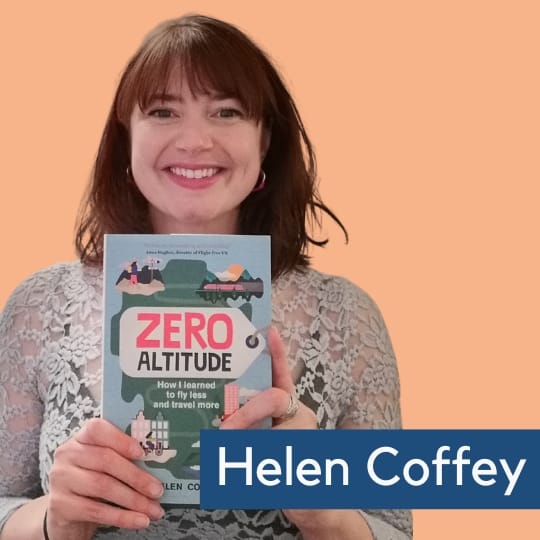This is episode 3 of our 2023 podcast series. Listen to the episode here and find other episodes and previous series here.
In this episode we meet runners Innes Fitzgerald and Damian Hall.
Innes recently made headlines by refusing to fly to Australia to take part in the world cross country championships, and Damian is an established ultra-marathon runner who is the co-founder of Green Runners and author of We Can’t Run Away From This.
Flight Free UK
Innes, tell us about deciding not to travel to Australia for the world cross country championships.
Innes
It was a really tough decision. I wanted to go to Australia but I couldn’t really justify going so I wrote a letter to British Athletics and told them I didn’t want to go because of the flight and the environmental consequences of that.
I was quite shocked originally by the media attention! I wanted to share it because I wanted people to talk about it, but I was a bit overwhelmed by the fact that there were so many people who were sharing it. Most of them were supportive though.
Flight Free UK
Have you always seen yourself as having a responsibility to reduce your emissions as much as possible?
Innes
I’ve always been quite aware of the environment and I think that’s true of young people nowadays. I’ve been educated by my parents, so I’ve learned about the environmental impacts and that led me to not want to fly at the moment.
Flight Free UK
What was British Athletics’ reaction? Did you get a response from them?
Innes
I did get a reply but it was very short. It just said, OK, thank you, and that was kind of it.
Flight Free UK
Damian, you said you have been inspired by Innes. Can you explain why?
Damian
I saw Innes' story on social media, and there were several of us sharing the story and saying how cool it was, especially because she is so young. I have a friend who also decided not to fly, and the response he got from the selectors was not sympathetic or encouraging. It was surprisingly unsupportive which was really disappointing.
For me and my friend we’ve got a lot less to lose by opting out of some things whereas for Innes it seems such a brave decision, which is reflected by the mainstream response it got.
Flight Free UK
Damian, you are also trying to cut down on your emissions for your own races. What is your policy when it comes down to flying for races?
Damian
I used to fly around three times a year for international races and in 2019 I flew five times. Towards the end of that year I started thinking about my emissions, my footprint and my effect on the planet, and I haven’t flown since.
So what I do now is I think, how important is that event or challenge that I might consider going to? How important is it really? I wrote a list and I scratched a few off, for example, there’s a race I’d love to do on the other side of India, but realistically there’s no way of getting there without two flights, so I’ve decided I’m never going to do that. So I narrowed my list down to two or three things globally that I really want to do.
The next question is what’s the lowest carbon way you can get there? For example, I used to fly to the Ultra-trail du Mont Blanc, and now I get the train. I appreciate it does cost a little bit more and not everyone can do that, but I’ve got the train there twice and it was really easy.
Flight Free UK
Do you think there's a culture of flying that is particularly prevalent in athletics? Is it the same in other areas or is there a pressure to fly for athletes?
Damian
In my area of athletics, most of the glamourous races are abroad in the mountains, often in the Alps or the Dolomites or in America. Obviously social media is a big factor. You see these wonderful pictures of people running in these amazing mountains and it feels like everybody’s travelling to run in the mountains.
In a way, lockdown came at the right time. We couldn’t travel and some of us got out in Britain. I feel like most of my running friends are travelling less and when they do, they are thinking about trains or getting together in a van or a car which is an improvement. I feel like in my area of the sport there is a cultural shift.
Innes
I think that if you are a top athlete you are expected to fly. There’s also a lot about training at altitude, and you see that on social media. I think that it depends on the person and how their body is affected by altitude or not. In terms of racing there definitely is a pressure to fly even if it is indirectly.
Flight Free UK
Do you think that there are enough places in the UK for your racing? Should we focus more on local events and hold international events more infrequently?
Innes
There are a lot of locations in the UK for cross country events, and I run on a track in the summer, so in terms of competing in a country there’s no need to go abroad. It becomes more difficult if you are the top athlete and you want to compete against people who are at your level, and the only people who are at your level are abroad. Then it becomes more challenging.
Flight Free UK
Innes, earlier in this season you took the train to one of your races. Can you tell us where that was and what the event was, and what it was like taking the train there?
Innes
It was the Cross Country Championships in Turin in Italy. The rest of the team were flying, but I took the decision to go on the train with my Dad. I think travelling overnight with quite a few hours on the train took quite a lot out of me when I was racing. I didn't quite have what I would have had if I’d done it in the UK. But I’ve never flown so I might not have had that energy either by going on the plane!
Flight Free UK
Damian, do you have any tips for Innes? What’s your experience been like?
Damian
Taking these ethical stances may compromise your performances and that makes it even more impressive that Innes has chosen to do that. Flying might sound relaxing, but it isn’t necessarily – it’s often very cramped. There’s a lot of waiting around in airports, and I get dehydrated because they take your water away and I often forget to get some more. Your flight might only be two hours but actually you have to get to the airport 2-3 hours before that, so it’s not always that much smoother.
Spread things out, allow time for delays, take breaks and take some of your own snacks rather than having to rely on what's on the trolley. I must admit that the first time I travelled to a race by train my race was terrible. I don’t think that was the factor as I had arrived a day earlier and had plenty of rest. But time to rest and time to recover by getting there a day earlier is definitely what I’d recommend.
Innes
We went to Belgium for a race a couple of weeks ago, so the whole team went on the Eurostar. The rest of the team was really surprised at how quick and smooth it was. They said it was so much easier than flying, which was encouraging. We don’t really have a choice, it's what the team managers decide, but I think more athletes would like to take the more environmental option if it was there.
Flight Free UK
Do you think there are specific things that the industry could do to encourage those low carbon travel options?
Innes
I think incentivising not flying would definitely help. It is not what the government’s doing right now. Sir David King said recently that he doesn’t think that athletes should be not allowed to fly, but that they should be given a carbon budget that they can use in their career. So we shouldn’t be taking flying for granted but we shouldn’t cancel out flying completely.
Flight Free UK
Damian, in your book ‘We can't run away from this’, do you explore some of the things that could happen in the industry to make it a bit greener?
Damian
I started from an individual perspective of your average runner, and looked at what would be the biggest elements in their carbon footprint. Obviously travel is the biggest thing. Second it’s the emissions of our sportswear, and thirdly it is our diets.
Another area would be the events themselves. Over 90% of the footprint of the big city marathons such as the London Marathon and Paris Marathon comes down to their travel. And with things like football, you have the crowds and fan travel. I think sport on the whole is way behind the curve. There’s a lot to tackle and there’s some reluctance to ask the big questions.
Flight Free UK
So the big questions then! Innes, for a runner of your standard, the Olympics is something that you must have somewhere in your head. And it’s a massive international event that will very likely require a flight. What’s your take on that?
Innes
Obviously the Olympics is the biggest dream and just to go would be the most amazing opportunity. I’d love to go but I can’t say how I’d behave at the moment. The carbon emissions that come from holding such huge events is just astronomical. We’ll have to wait and see what happens – that is my biggest dream.
You can find Innes on Instagram @innes_fitzgerald and Damian on twitter @Ultra_Damo. Damian also has his own website where you can find more information on his book and his work with The Green Runners.
Listen to the full episode here and find other episodes and previous series here.
If you are inspired to sign up for a flight free year or to make your own pledge, you can do so on our website: flightfree.co.uk
Credits:
Interview conducted and produced by Anna Hughes. Voiceover: Lou Millington. Intro music: Call to Arms by Aaron Paul Low. Outro music: First Action Hero by Aaron Paul Low.




